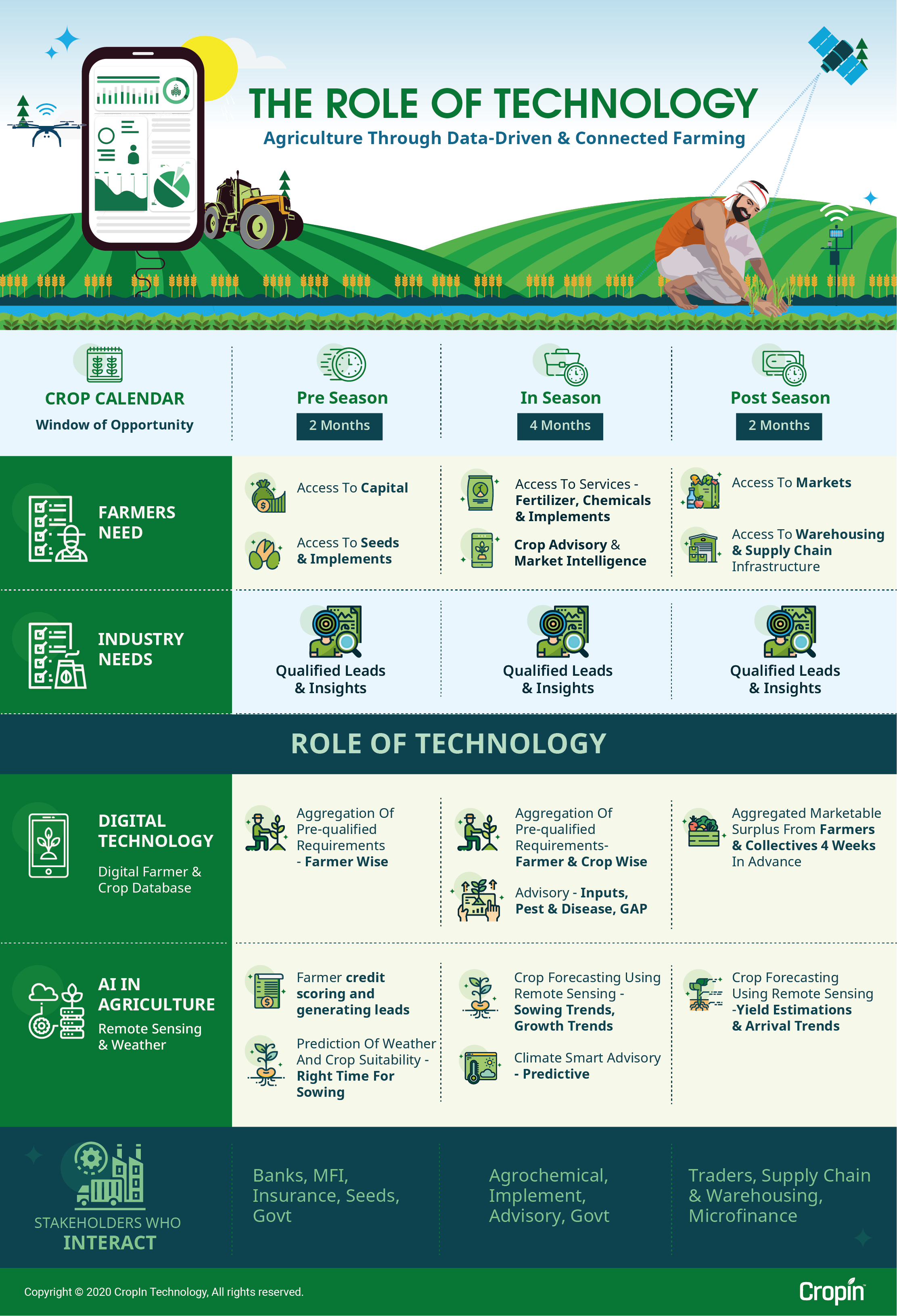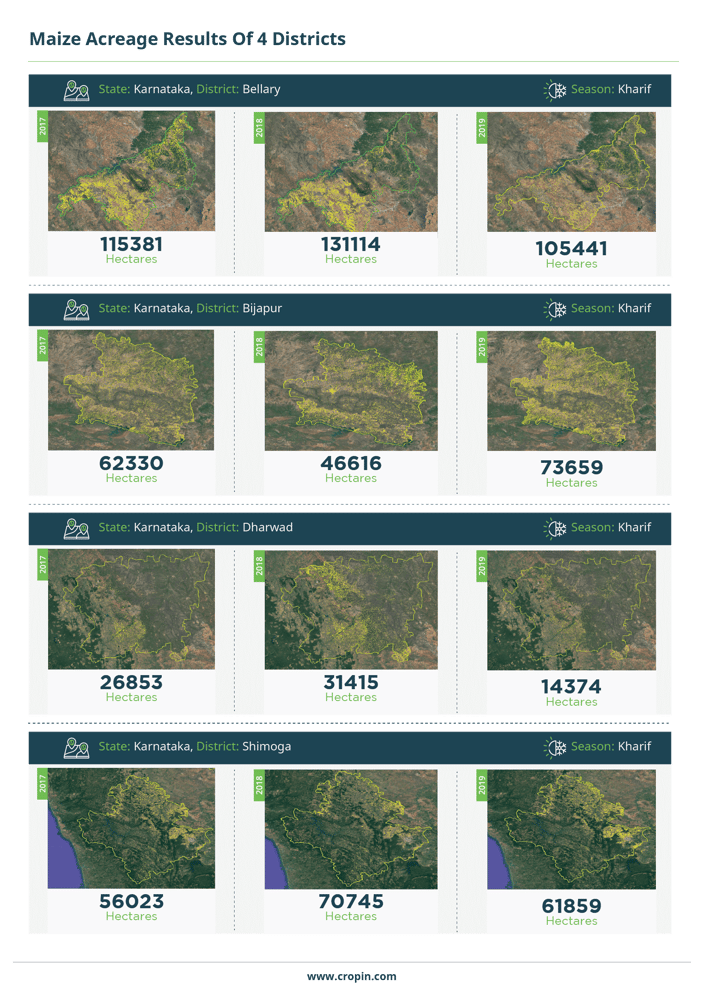When we speak of crop cultivation, more often than not, the spotlight is primarily on the production of the crop, starting with pre-sowing and soil preparation leading up to its harvest. However, there is more to crop cultivation than just the annual cycle of 3 to 8 months. Farmers start preparing for the season at least a few months before, making sure they have the right seeds and enough capital, and also adequate knowledge of cultivation practices if they are trying a new variety of seeds. They will also have to consider if there will be sufficient market demand for their produce at the time of harvest and if they will receive the best price possible from buyers. Not to forget, the farmer has to constantly stay prepared for any crisis that could occur during the season, including diseases or pest attacks, unexpected changes in the weather, or natural calamities, which could all take away the hope of earning a good income from the sale of the harvest. However, that being said, the use of farming technology could rewrite the whole narrative for the farmer and make the entire process, from start to finish, more efficient and profitable.
Today, enabling Agri technology platforms such as CropIn’s act as a cardinal bridge between farmers and other stakeholders in the agroecosystem that empowers them to achieve optimized agricultural productivity. Tech-enabled agriculture contributes to the prosperity of the farmers right from providing better access to seeds, implements, and capital pre-season, to ensuring support in the form of knowledge, services, and agri-inputs during the many months of cultivation, and offering direct access to a choice of markets and warehouses and cold storage post-harvest.
The Role Of Digital Farming Technology
Let us dive into some of CropIn’s collaborations with various stakeholders across geographies to understand the impact of technology interventions at different stages of crop production.

PRE-SEASON INTERVENTIONS
A European agribusiness that collaborates with farming families across continents adopted a digital approach recently by partnering with CropIn. The organization aims to ensure fair trade and to deliver certified organic produce to consumers in Europe and desires to set up a centralized system that effectively manages its global operations. Included in this technology-driven approach was the pre-season disbursement of cash to farmers for them to purchase seeds and agrochemicals. This pre-finance was later adjusted by the organization against the value of the harvest it acquired from farmers. These transactions are recorded in SmartFarm’s order management module and made available on the cloud platform for the relevant users of the application.
CropIn’s platform also enables lending institutions to appraise the creditworthiness of farmers. In Nairobi, a cooperative non-profit organization needed a centralized system that provided effective data monitoring and management, while also simplifying the credit rating process. This led to a partnership with CropIn that enabled the organization to digitize field operations and remotely monitor paddy crops across 53 plots in Kenya. Using SmartFarm’s mobile application, the field staff were able to create accurate and complete digital records of farm and farmer details. Leveraging AI-data-led Smartrisk® allowed higher level users to generate yield and water stress distribution estimation using the plot history, existing vegetation, and sowing window data collected on Smartrisk®. This intelligence determined the credit rating and the creditworthiness of the farmers. The entire process, now powered by scientific farming technology, increased the efficiency of the loan disbursal process and reduced the delay caused by paperwork. Once farmers received their loans, the organization could remotely monitor the performance of the registered farm plots using CropIn’s platform, which facilitated the timely recovery of loans when the crops were ready for harvest.
IN-SEASON INTERVENTIONS
During the crop production cycle, farmers will require quick and easy access to agrochemicals to boost plant growth and prevent damage caused by pests or diseases. It is nearly impossible for agrochemical companies to send field agents to every farm in a region and get an estimate of the products the farmers would require throughout the season. As a consequence, an American agrochemical and agricultural biotechnology corporation decided to partner with CropIn to implement Smartrisk®. The AI-powered engine would allow the company to estimate the plot acreage in the desired region based on a range of remote-sensing data, in addition to a three-year plot history, existing vegetation, and sowing window data. Now with this possibility, the company was able to identify maize-growing villages in Bellary, Shimoga, Bijapur, and Dharwad districts of Karnataka, India. Further, this facilitated the company to manage internal sales and inventory, and decide on marketing strategy for the upcoming seasons.

Now that predictive analysis allows agrochemical companies to make their products available for farmers when they need them the most, how do farmers know which product to use, at what point in the crop cycle, and how much? This is made easy by SmartFarm® as tried and tested by several farming companies globally. The digital farming solution permits authorized users to configure a package of practices (PoP) recommended by agronomists, which are then used by field agents to guide farmers in adopting good agricultural practices. An organization in India that manufactures and processes spices utilizes this capability to monitor chili cultivation across nine districts in India. The PoP was pre-configured by the company, and the field staff ensured that farmers adhered to the recommended practices, including appropriate and prudent use of agrochemicals, to achieve quality harvest. The information recorded by the field agents helped generate reports that provided a comprehensive picture of the agri-input application and identified farmers who had used non-recommended chemicals. This intelligence ensured that farmers meet the requirements as specified by the organization, that further comes in handy during export certification processes to guarantee the safety and hygiene of the produce.
This capability was implemented by CropIn the World Bank-funded project Sustainable Livelihoods And Adaptation to Climate Change (SLACC) to promote the adoption of climate-smart farming practices by smallholders in the Indian states of Bihar and Madhya Pradesh. CropIn’s farming technology platform helped deliver crop and weather-based advisories to smallholder farmers that improved agri-productivity and helped them mitigate risks more effectively. The POP advisories covered soil and water management, crop management software practices, pest/disease forecast and management, and nutrient management. These were broadcasted to farmers at a set time during the pre-sowing, post-sowing, and vegetative phases of the crop. Meteorology specialists assigned to each district sent weather-based advisories through CropIn’s platform once every one or two weeks, or for specific weather conditions. Both of these advisories were sent as text messages directly to the registered farmers’ mobile phones. This proactive approach also saw a decline in the number of alerts that were raised by farmers over the years as the advisories enabled them to ensure better crop protection through the crop cycle.
Watch how CropIn tied up with the SLACC project to enable the adoption of climate-smart practices by smallholder farmers
POST-SEASON INTERVENTIONS
SmartRisk’s remote sensing and forecasting capabilities empowered stakeholders in the agri-supply chain to arrive at data-driven sourcing decisions, by which the farmers were also assured of the sale of their produce weeks before harvest. One of the organizations is an international civil society organization that promotes the development of profitable supply chains that are also socially responsible and ecologically sound. Using SmartRisk®, the organization was able to remotely monitor 990 farm plots of soybean in four regions of Africa. Satellite-imagery-based data and CropIn’s proprietary algorithms facilitated the identification of water stress and its impact on crop production. Using this intelligence, they supported the farmers to improve farming practices and improve their productivity. The organization then used the production information to make smarter decisions regarding sustainable farmer livelihoods, business commitments, and supply chain management.
CropIn’s modern farming technology also plays a critical role in improving access to markets with its end-to-end traceability feature. Punjab Agri Export Corporation (PAGREXCO) recently partnered with CropIn to establish a first-of-its-kind ‘Seed Potato Traceability’ along the entire value chain. Capturing several critical parameters through every stage of production and systematically monitoring them enabled farmers to produce superior-quality seed potatoes. This data collected by field agents created a digital record of all farm activities, which was then used by the organization to secure certification for quality standards that applied to both domestic and export markets. By scanning the unique QR code printed on each seed potato packet, buyers could trace the origin of the seed potatoes. This provided them with exact details about where and how the farmers cultivated the seeds, and whether or not they are PAGREXCO-certified. Additionally, this traceability minimized the sale of counterfeit and low-quality seeds under the name of Punjab-grown seed potatoes and prevented the mixing of high-quality certified seeds with sub-par ones, which results in low yields and poor ROI for potato growers. While on the one hand, it boosts credibility for PAGREXCO’s brand name and consequently promotes farmers’ trust in its products, it also enables registered farmers to fetch a premium price for their certified seeds on the other.
A Proactive Approach To Ensure Increased Per-Acre Value
Digital farming solutions offer immense potential for the active collaboration of stakeholders in the agroecosystem, as illustrated by some of CropIn’s remarkable partnerships and their outcomes for clients across countries. Such interventions using advanced farming technology enable farmers to interact better with other actors, gain better access to inputs, information, and service and improve their agricultural productivity and profitability.
Explore how CropIn’s solutions can enable your organization to improve engagement with farmers globally. Get in touch with us today !









